Einstein, Kafka and Planck vs. Time, Space and Conventions
World Premiere of a new play by Robert Marc Friedman
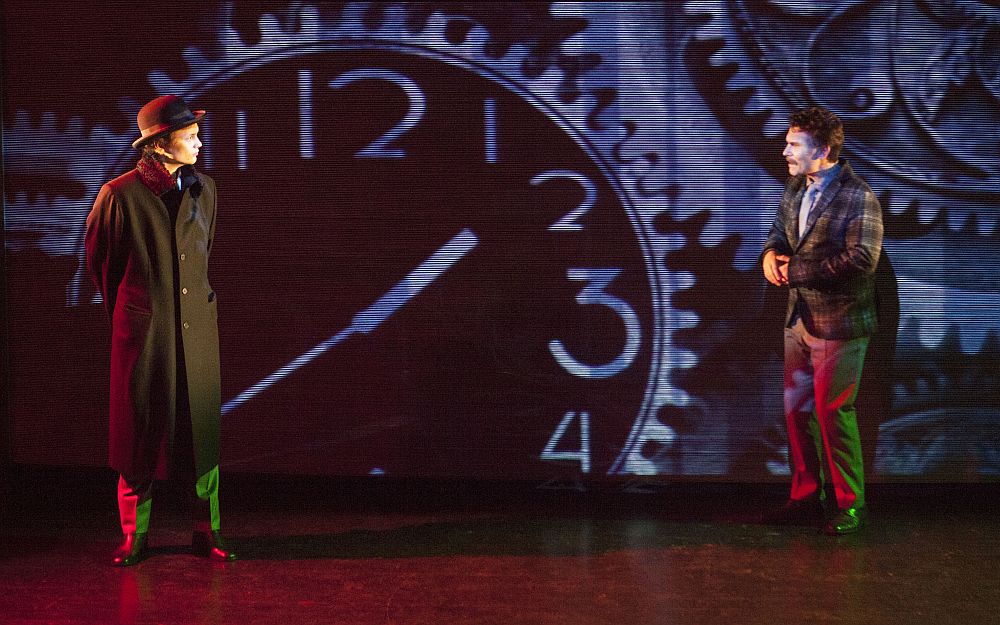 The foundations of European society were being shaken and World War I was about to deal them a final blow when Albert Einstein presented his general theory of relativity in Berlin on November 25, 1915 – now even space, time, gravity and the cosmos were no longer what they used to be. Everything seemed to be relative, all conventions were crumbling and God had left the building.
The foundations of European society were being shaken and World War I was about to deal them a final blow when Albert Einstein presented his general theory of relativity in Berlin on November 25, 1915 – now even space, time, gravity and the cosmos were no longer what they used to be. Everything seemed to be relative, all conventions were crumbling and God had left the building.
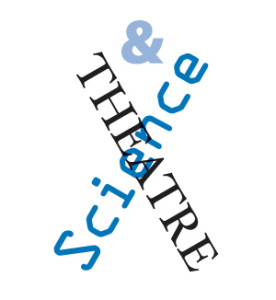 Within a few years, Einstein emerged as an internationally-acclaimed scientist comparable to Copernicus or Newton. In Stockholm, however, the Nobel Committee for Physics resisted the massive support for his theories of relativity. What was at stake was whether or not a prize should go to Einstein and his “corrupt Jewish science,” as it was called by those who would soon instigate the next European catastrophe.
Within a few years, Einstein emerged as an internationally-acclaimed scientist comparable to Copernicus or Newton. In Stockholm, however, the Nobel Committee for Physics resisted the massive support for his theories of relativity. What was at stake was whether or not a prize should go to Einstein and his “corrupt Jewish science,” as it was called by those who would soon instigate the next European catastrophe.
At the same time in Prague, Franz Kafka whittled away at the conventions of literature – transforming sons into beetles, examining the fate of people lost in indecipherable bureaucratized societies and making the strange look normal.
Einstein and Kafka met in Prague. They had things in common.
Einstein had been recruited to Berlin by the highly-revered leader of German physics, Max Planck. Beyond their devotion to theoretical physics and classical music, however, they had few things in common.
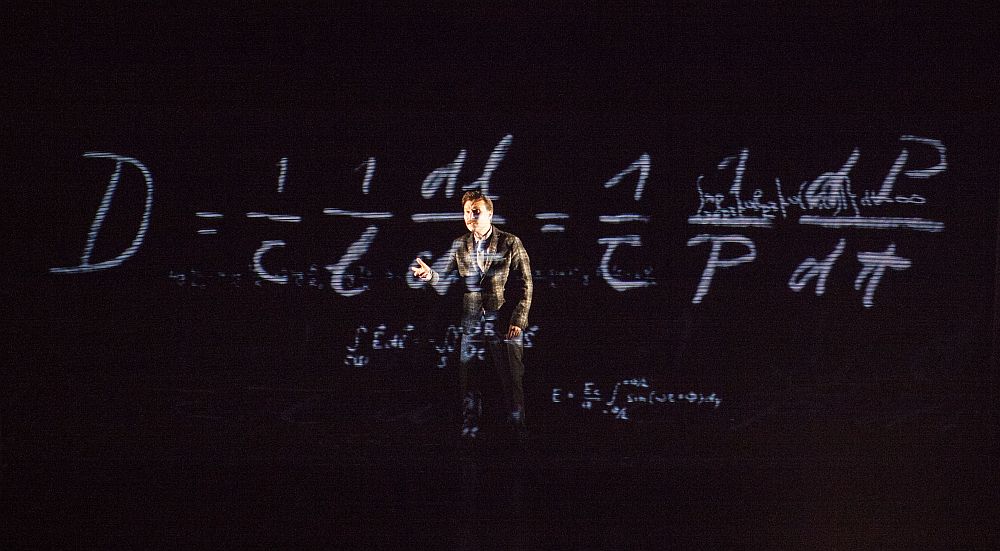
Robert Marc Friedman’s new play tells a tale of strained friendships, the search for new perspectives and scientific integrity against a backdrop of a fierce battle between uncompromising opponents in a decaying society.
ROBERT MARC FRIEDMAN is a scholar and playwright born in 1949 in Brooklyn, New York, and now living in Norway. After studying physical sciences and theatre at New York University, he earned a doctorate in history of science at Johns Hopkins University. He is currently professor at University of Oslo and professional member of the Dramatists Guild of America. Friedman researches the history of modern physical and environmental sciences in their social and cultural contexts. Among his numerous publications are Nobel Physics Prize in Perspective in Nature (1981), Appropriating the Weather: Vilhelm Bjerknes and the Construction of a Modern Meteorology (1989), and The Politics of Excellence: Behind the Nobel Prizes in Science (2001). Friedman’s dramatizations of his research include a television film, Vitenskap i motvind (1982), for Norwegian State Broadcasting [NRK] and stageplays performed in several countries: Remembering Miss Meitner (2002), Becoming Albert Einstein (2005), and Amundsen vs Nansen (2011). Friedman’s numerous honors for both scholarly and artistic contributions, include Tetelman Fellow at Yale University (2009) for public understanding of science and the University of Oslo’s Public Outreach [Formidling] Prize (2015). He will be an artist-in-residence at the Djerassi Artist Residency (California) in 2016.
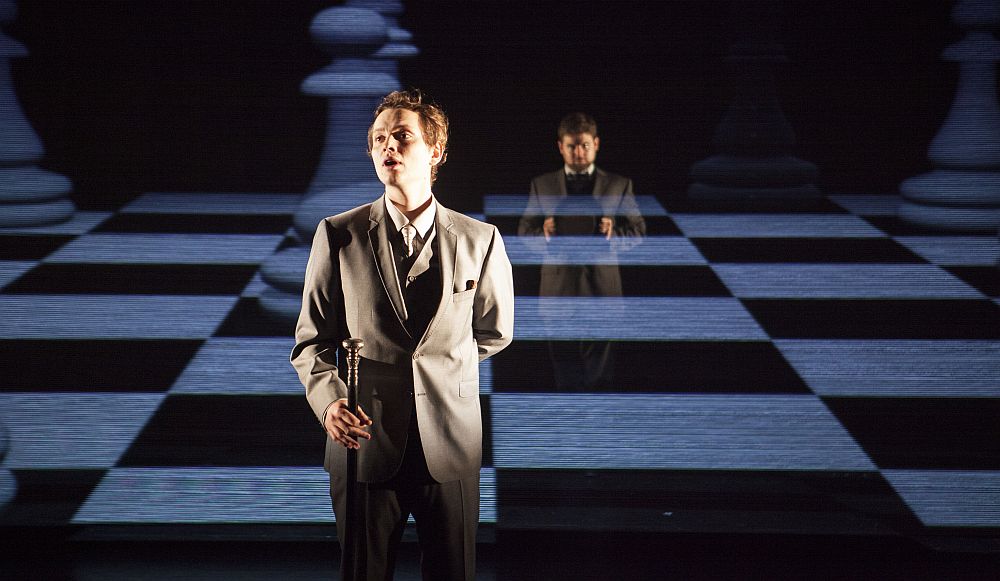
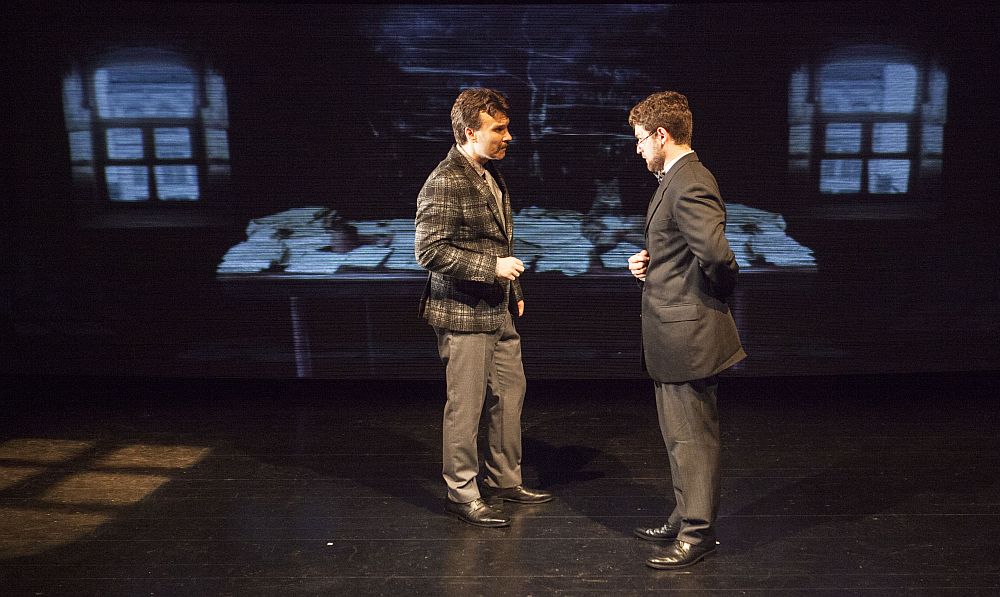
Pics: Gerald Wesolowski
- Fri, November 20, 2015 | 8pmMain Stage
- with 8 additional performances until Nov 30th
World Premiere
►Lecture by Prof. Tilman Sauer (Universität Mainz): Einstein’s Rise to Fame and the Emergence of Modern Theoretical Physics / Sunday November 29th, 7pm
►Post-performance discussion with Robert Marc Friedman, Günther Grosser and the cast on November 25th, 2015 in conjunction with Theater Scoutings Berlin!
Written by Robert Marc Friedman
Directed by Günther Grosser
With Ben Maddox, Logan Verdoorn and Max Wilkinson
Set Design: Tomas Fitzpatrick | Costume Design: Heike Braitmayer | Video: Magnus Hengge | Lighting Design: Katri Kuusimäki | Scientific Coordinator: Regine Hengge
Commissioned by the Science & Theatre Program at English Theatre Berlin | International Performing Arts Center and the Max Planck Institute for the History of Science
In cooperation with the Institute for Philosophy (History of Science) at the Technische Universität Berlin, the Department for Archeology, Conservation and History (History of Science) at the Universitetet i Oslo (Norway) and the Faculty of Biology /Department of Microbiology at the Humboldt-Universität zu Berlin
Links
- Review on BerlinArtLink
- Interview on rbb inforadio with Arianna Borrelli
- Excellent New York Times essay on General Relativity by David Kaiser (MIT)
- a very early attempt on explaining Einstein´s new perspectives – a animation film by Max Fleischer from 1923 !!!
- Portrait of author Robert Marc Friedman in ‘Tagesspiegel’
 Supported by Hauptstadtkulturfonds
Supported by Hauptstadtkulturfonds
Text auf deutsch
TRANSCENDENCE
Welturaufführung eines neuen Stückes von Robert Marc Friedman
Die sozialen Fundamente Europas gerieten ins Wanken und der 1. Weltkrieg sollte ihnen bald den letzten Schlag versetzen, als Albert Einstein am 25. November 1915 an der Preußischen Akademie der Wissenschaften in Berlin seinen legendären Vortrag zur Allgemeinen Relativitätstheorie hielt – von nun an waren sogar Raum, Zeit, Schwerkraft und der Kosmos nicht mehr das, was sie einmal gewesen waren. Alles schien nun relativ zu sein, die Konventionen bröckelten, und Gott hatte das Haus verlassen.
 Innerhalb weniger Jahre avancierte Einstein zum weltweit gefeierten Wissenschaftler, vergleichbar mit Kopernikus und Newton. Das Nobelpreiskomitee für Physik in Stockholm allerdings setzte der massiven Befürwortung von Einsteins Relativtätstheorien heftigen Widerstand entgegen.Was verhandelt wurde, war die Preiswürdigkeit Einsteins und seiner “jüdischen Wissenschaft”, wie sie schnell von jenen genannt wurde, die bald die nächste europäische Katastrophe vom Zaun brechen sollten.
Innerhalb weniger Jahre avancierte Einstein zum weltweit gefeierten Wissenschaftler, vergleichbar mit Kopernikus und Newton. Das Nobelpreiskomitee für Physik in Stockholm allerdings setzte der massiven Befürwortung von Einsteins Relativtätstheorien heftigen Widerstand entgegen.Was verhandelt wurde, war die Preiswürdigkeit Einsteins und seiner “jüdischen Wissenschaft”, wie sie schnell von jenen genannt wurde, die bald die nächste europäische Katastrophe vom Zaun brechen sollten.
Gleichzeitig rüttelte in Prag ein Mann namens Franz Kafka an den Konventionen der Literatur – er verwandelte Söhne in Käfer, untersuchte das Schicksal von Leuten, die in die undurchschaubare Hölle der Bürokratie gerieten und ließ das Merkwürdige normal wirken.
Einstein und Kafka waren sich in Prag begegnet – sie hatten ein paar Gemeinsamkeiten….
Einstein war von der hochangesehenen Führungsfigur der deutschen Physik, von Max Planck, nach Berlin gelockt worden. Außer ihrer gemeinsamen Wertschätzung der theoretischen Physik und der klassischen Musik trennte sie jedoch vieles….